“My scientific work is motivated by an irresistible desire to understand the secrets of nature –
by nothing else.”
Albert Einstein, 1949
HONOURS, PRIZES AND AWARDS
The honours, prizes and awards which are listed here shortly and in chronological order represent a great number of further honours, prizes and awards, Albert Einstein was awarded during his lifetime.
The author wants to thank the universities, societies, institutes, etc. named on this site for their friendly support.
Explanation:
Dr. h. c. (Doctor honoris causa): honorary doctorate which is awarded by universities.
Honours, prizes and awards:
| 1909 | University of Geneva | Honorary doctorate |
| 1919 | University of Rostock | Honorary doctorate |
| 1921 | Princeton University | Honorary doctorate |
| 1921 | University of Manchester | Honorary doctorate |
| 1922 | Nobel Foundation, Stockholm | Nobel Prize in Physics for the year 1921 |
| 1923 | University of Madrid | Honorary doctorate |
| 1923 | Order “Pour le mérite” | Admission to the order |
| 1923 | Genootschap ter Bevordering van Natuur-, Genees- en Heelkunde | Genootschaps Medal |
| 1925 | Royal Society of London | Copley Medal |
| 1926 | Royal Astronomical Society | Gold Medal |
| 1929 | German Physical Society | Max-Planck-Medal |
| 1929 | University of Paris | Honorary doctorate |
| 1930 | ETH (Eidgenoessische Technische Hochschule), Zurich | Honorary doctorate |
| 1931 | Oxford University | Honorary doctorate |
| 1934 | Yeshiva College, New York | Honorary doctorate |
| 1935 | Franklin Institute, Philadelphia | Benjamin Franklin Medal |
| 1935 | Harvard University | Honorary doctorate |
Dr. h. c. – awarded on July 9, 1909
On Friday, July 9, 1909, the University of Geneva awarded Albert Einstein the honorary doctorate on occasion of the 350th founding year of the university. 110 persons were honored during this ceremony. Among the honored persons were also the French chemist and physicist Marie Curie (1867-1934) and the German chemist and philosopher Wilhelm Ostwald (1853-1932). Einstein was awarded the honorary doctorate following the proposal of the experimental physicist and Director of the Physical Institute of the University of Geneva Charles Eugène Guye (1866-1942). Einstein was present during the ceremony. On the day of the award he wrote in a letter to Lucien Chavan (1868-1942) and his wife Jeanne: “… I send you an affectionate greeting from the hospitable Geneva. I am delighted about the friendliness and kindness of the people …”
It was Chavan who had convinced Einstein to take part in the ceremony which is connected with the award, after Einstein had, accidentally, thrown the invitation into the “official wastepaper basket” of the Bernese patent-office.
In his memories concerning the end of the ceremony it says:
“The ceremony ended with the most opulent feast that I have taken part in during my whole life. Then I said to a patrician from Geneva who was sitting next to me: ‘Do you know what Calvin would have made if he was still alive?’ As he said no, and asked me for my opinion, I said: ‘He would have erected a large pyre, and he would have burned us all because of sinful gluttony.’ The man did no longer speak to me, and this is the last thing I can remember with regard to the noteworthy ceremony.”
Source: “Albert Einstein – A biography” Albrecht Fölsing, Suhrkamp Verlag, Frankfurt / Main, 1993
It was the reformer Johannes Calvin (1509-1564) who had, in 1559, founded the Geneva Academy, the predecessor of the University of Geneva.
It was Albert Einstein‘s first honorary doctorate, but many more were to follow.
Dr. h. c. – awarded on November 27, 1919
During the 500th anniversary celebrations (November 25 to 27, 1919) of the University of Rostock, Albert Einstein and Max Planck (German physicist and Nobel Prize winner, 1858-1947) were awarded honorary doctorates.
Due to a shortage of coal in the post-war period, the start of the celebrations was postponed from November 12 to November 25, 1919.
The awarding of honorary doctorates by the deans was carried out on the last day of the 500th anniversary celebrations on November 27, 1919.
Einstein was awarded a honorary doctorate in medicine “in recognition of the enormous work of his mind”. In his letter of thanks to the dean of the medical faculty Einstein wrote: “I thank you very much for sending me the certificate which represents your excellent taste, and for your friendly covering letter. The wonderful celebration of your venerable university and the heartfelt hospitality which I was allowed to experience in Rostock will always be a nice memory for me.”
The honorary doctorate which Einstein was awarded in Rostock is the only one he was given in Germany!
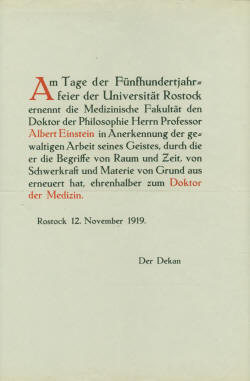
Translation:
„On the day of the celebration of five hundred years Rostock University, the Medical Faculty awards professor Albert Einstein, Doctor of Philosophy, the honorary Doctor of Medicine in recognition of the enormous work of his mind, through which he has renewed the terms of space and time, gravity and matter from scratch.
Rostock, November 12, 1919.
The Dean“
Illustration Credit:
Courtesy Universitaetsarchiv Rostock
Signature: Prom. med. Nr. 150/ 1919, Albert Einstein

University of Rostock
Credit:
Courtesy University of Rostock.
Dr. h. c. – awarded on May 9, 1921
“We greet the new Columbus of science, who travels lonesome through the foreign seas of thinking.” The German speech held by the president and head of the Princeton University John Hibben, began with these words. It was held on the occasion of awarding Albert Einstein the honorary doctorate on Monday, May 9, 1921. The celebration took place in Alexander Hall.
Albert Einstein, who visited the United States for the first time, accompanied Chaim Weizmann (1874-1952) to succeed in financing the planned Hebrew University of Jerusalem. They stayed from the beginning of April until the end of May. In Washington, Einstein was welcomed in the White House by President Warren G. Harding (1865-1923). After that he visited, among other cities, Princeton, Chicago and Cleveland. In Princeton he held the first of five lectures on the theory of relativity – Stafford Little Lectures (May 9 to May 13) after being awarded the honorary doctorate. The lecture hall was overcrowded. Not only students and members of the faculty, but also many curious and sensation-seeking people were present. Einstein spoke German, so only few people could follow his explanations. After he had finished his speech, Einstein’s lecture was summed up in English by a member of staff of the physical faculty. The demand for the second and the three following lectures was no longer that great and all the interested people found a comfortable place.
These lectures have been translated into English and published entitled “The Meaning of Relativity.” The German text was published in 1922 entitled: “Four Lectures on the Theory of Relativity.”
Approximately ten years later, the little town of Princeton, New Jersey, should become Albert Einstein’s new home.
Dr. h. c. – awarded on June 9, 1921
Albert Einstein was awarded the honorary doctorate in natural sciences in the big lecture hall of the University of Manchester on Thursday, June 9, 1921. He was honored by the Vice Chancellor of the University, the English mineralogist Sir Henry Alexander Miers (1858-1942). Einstein said German words of thanks, and also held his lecture in German language.
In its evening edition of June 10, the Vossische Zeitung reported about the ceremony:
“Einstein honored in Manchester. The yesterday lecture of Prof. Einstein at the University of Manchester was, as our London reporter says, a homage to the German scholar. The big lecture hall of the university was filled with approximately thousand persons who gave Einstein a warm welcome. Before the lecture was held, the chemist Prof. Diron, who explained Einstein‘s merits, stood up and explained that the name of the discoverer of the theory of relativity may be mentioned next to the ones of the greatest researchers. He had done more for the progress of the world than statesmen and conquerors. The Vice Chancellor of the university, Sir Henry Miers, then awarded Einstein the honorary doctorate and explained that science was independent from the blood feud between the people. Manchester was proud to be able to honor the German scholar. Einstein then held his lecture in German. He thanked for the honors that were awarded to him, and expressed his hope that the demonstration would contribute to the improvement of the international relationships.”
During the time from June 8 until June 17, Einstein was on a lecture tour through England (Liverpool, Manchester, London and Oxford). Politically significant was his London encounter with the British politician Lord Richard Haldane (1856-1928) and with Prime Minister David Lloyd Georg (1863-1945).
Royal Swedish Academy of Sciences
Nobel Prize – awarded on December 10, 1922
Albert Einstein was awarded the Nobel Prize in Physics for the year 1921. He was awarded the prize “for his work on theoretical physics, especially for his discovery of the law of the photoelectric effect”. It is remarkable that Einstein was not awarded the Nobel Prize for the theory of relativity.
During the presentation of awards, the laureate is awarded the Nobel Certificate and the golden Nobel Medal with the picture of the founder Alfred Nobel (Swedish chemist and industrial, 1833-1896) by the Swedish king. The prize money is only payed when the Nobel speech has been held.
Einstein was on a journey through Japan when he was awarded the prize on December 10, 1922. Who should take receipt of the prize for him? Shortly before the presentation of awards there were still differences of opinion about the nationality of Einstein. Was he a German or a Swiss citizen? Finally it was the German legate in Sweden who received the prize in Einstein’s name. Einstein himself was handed over the document and the medal in Berlin by the Swedish ambassador in Germany. As the statutes of the Nobel Foundation stipulate that the Nobel laureate has to hold his Nobel speech before he receives the prize money, Einstein still had to wait for some time until he received the money.
Einstein held his Nobel speech on July 11, 1923 in the Jubilee Hall in Goeteborg in presence of the king and in front of about 2000 listeners. He spoke about “fundamental ideas and problems of the theory of relativity”. After the speech King Gustav V had a vivid chat with Einstein.
The total amount of the prize money – about 120.000 Swedish Krones (back then converted about 180.000 Swiss Francs) – Einstein made available to his first wife Mileva and his two sons Hans Albert and Eduard.
Dr. h. c. – awarded on March 8, 1923
Fulfilling the traditional customs Albert Einstein received the degree of an honorary doctor on Thursday, March 8, 1923 – in the morning and during a special meeting of the University of Madrid. Speeches were among others held by the Principal of the University, Professor José Rodríguez Carracido (1856-1928), Professor José Maria Plans (1878-1934), a student of the University, and the German ambassador in Madrid, Ernst Langwerth von Simmern (1865-1942). He held his speech in Spanish language. Albert Einstein held his acceptance speech in German.
Einstein‘s entry into his travel log dated March 8, 1923:
„Ehrendoktor Aecht spanische Reden mit zugehörigem bengalischem Feuer Lange aber inhaltlich gute Rede des d. Gesandten über deutsch-span. Beziehungen; (aber ins) ächt deutsch. Nichts rhetorisches. (Abends) Dann Besuch bei techn. Studenten. Reden und nichts als Reden, aber gut gemeint. Abends Vortrag Dann bei Kuno 1) musizieren. Ein Künstler (Direktor des Konservatoriums 2)) Poras spielte herrlich Violine.”
Translation:
“Honorary doctor Aecht Spanish speeches with corresponding Bengal firework Long but contentwise good speech of the German ambassador concerning German-Spanish relationships; (however) into ächt German. Nothing rhetorical. (in the evening) Then visiting technical students. Speeches and nothing but speeches, however, well-meant. In the evening lecture. Then playing music with Kuno 1). An artist (Director of the Conservatory 2)) Poras plays the violin – magnificent!”
Source:
Publisher: Diana Kormos Buchwald, among others, The Collected Papers of Albert Einstein, Volume 13, Princeton 2012
1) Kuno Kocherthaler, a relative of Einstein
2) Antonio Fernandez Bordas (1870-1950)
Albert Einstein and his wife Elsa were on a lecture tour through Spain with the stations Barcelona, Madrid and Zaragoza. They stayed in Spain from February 22 until March 15, 1923.
During Einstein‘s stay in Madrid he was awarded the diploma of a corresponding foreign member by the Academia de Ciencias on March 4. It was a formal meeting under the presidency of the Spanish King.
admission to the order – June 7, 1923
On Thursday, June 7, 1923 Albert Einstein was admitted to the order “Pour le mérite”. He received the medal Pour le mérite for science and arts, with which persons were and still are awarded “who have made themselves a name through widely spread recognition of their work in science and arts”.
The poet Gerhart Hauptmann (1862-1946), the mathematician Felix Klein (1849-1925), the sculptor Hugo Lederer (1871-1940) and the painter Max Liebermann (1847-1935) were also admitted to the order on this day.
Due to the political situation and thus the incidents in nazi Germany, Einstein renounced the membership to the order in 1933. An attempt of the President of the Federal Republic of Germany, Theodor Heuss (1884-1963), at the beginning of the 1950ies to persuade Einstein to renew his membership was in vain.
The order Pour le mérite for science and arts was founded by Friedrich Wilhelm IV, King of Prussia (1795-1861) in May 1842. The first civil Order of Merit of this kind in Europe should complete the military order of Frederick II, King of Prussia (1712-1786, “Frederick the Great”) of 1740. In 1924 it was converted into an “independent organisation of excellent scientists and artists” with new statutes. In the 30ies the fate of the order was uncertain and its disbanding was given a serious thought. Only through the President of the Federal Republic of Germany, Theodor Heuss, the order was revived and again entered the public consciousness in May 1952.
The order Pour le mérite is nowadays regarded as one of the highest awards in Germany, which a scientist or artist can achieved.
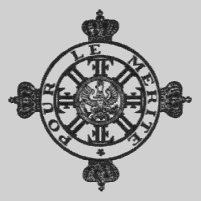
Illustration Credit:
Courtesy Order “Pour le mérite”.
Genootschap ter Bevordering van Natuur-, Genees- en Heelkunde
Genootschaps Medal – awarded on Dezember 13, 1923
The Dutch society Genootschap ter bevordering van Natuur-, Genees- en Heelkunde, which was founded in Amsterdam in 1790, promotes and supports activities in the areas of science and medicine. On Thursday, December 13, 1923, the society awarded its highest distinction, the Genootschaps Medal, in the auditorium of the Amsterdam university and thus honoured Albert Einstein and the Dutch physicist Hendrik Antoon Lorentz (1853-1928). The list of previous laureates contained names like for example the Dutch physicists and Nobel Prize laureates Johannes Diderik van der Waals (1837-1923) and Heike Kamerlingh Onnes (1853-1926).
Albert Einstein took personally part in the celebration taking place on occasion of the annual meeting of the “Genootschap” on December 13. Despite acceptance of the invitation, H. A. Lorentz did not.
In advance there was a letter from the Board of the society to Albert Einstein, which was dated “October 25, 1923”:
„Hochgeehrter Herr Professor Einstein,
im Namen der “Genootschap ter Bevordering van Natuur-, Genees- en Heelkunde in Amsterdam” haben wir das Vergnügen Ihnen mitzuteilen, dass die “Genootschap” in ihrer Sitzung vom 22. Oktober 1923 Ihnen und Herrn Professor H. A. Lorentz ihre goldene Medaille zuerkannt hat. Die Verleihung dieser Medaillen wird am 31. Oktober 1923 in der Jahresversammlung der Gen. in der Aula der Universität nachmittags um 4 Uhr stattfinden.
Es würde uns eine ganz besondere Ehre sein, wenn Sie der Verleihung dieser Medaillen durch Herrn Prof. J. D. v. d. Waals, Professor der Physik an unserer Universität, persönlich beiwohnen könnten, wie auch Herr Professor Lorentz es uns versprochen hat. …
Mit einer zustimmenden Antwort würden Sie uns eine besondere Freude machen. …”
Translation:
“Highly honoured Professor Einstein,
in the name of the “Genootschap ter Bevordering van Natuur-, Genees- en Heelkunde in Amsterdam” we have the pleasure to inform you that the “Genootschap” has awarded you and Professor H. A. Lorentz its golden medal in its meeting dated October 22, 1923. The presentation of these medals will take place in the annual meeting of the Gen. in the auditorium of the university on October 31, 1923 at 4 pm.
It would be a very special honour for us if you could personally attend to the presentation of these medals by Prof. J. D. v. d. Waals, professor of physics at our university, like also Professor Lorentz has promised to do. …
You would specially please us if you sent us a positive answer. …“
The presentation date which is mentioned in the letter seems to have been postponed.
Copley Medal – awarded on November 30, 1925
Albert Einstein was awarded the Copley Medal of the Royal Society in London in a ceremony on Monday, November 30, 1925. As tradition has it, the highest award of the society was handed over during its annual celebration. In 1925 the celebration took place in Burlington House, Piccadilly, in London. At the annual celebration the Royal Society awarded also other medals and prizes.
Einstein was awarded the Copley Medal by the English neurophysiologist Sir Charles Sherrington (1857-1952), the retiring president of the society. The presentation of the medal was one of the last official actions of Sherrington. After the presentation of the medals he handed over the position of the president after one term of office (five years) to the British physicist from New Zealand, Ernest Rutherford (1871-1937), from 1931 on Lord Rutherford of Nelson.
Some of the people who were awarded the Copley Medal before and after Einstein were the German mathematician Carl Friedrich Gauss (1838), the British physicist Sir William Thomson (1883), from 1892 on Lord Kelvin of Largs, the Dutch physicist Hendrik Antoon Lorentz (1918), the German physicist Max Planck (1929), the Danish physicist Niels Bohr (1938) and the English physicist Paul A.M. Dirac (1952).
Sir Geoffrey Copley made money available to the Royal Society to promote scientific work (1709). A few years later the Copley Medal was suggested:
“…a medal or other honorary prize should be bestowed on the person whose experiment should be best approved…”
The English physicist Stephen Gray (1666-1736) was awarded the first Copley Medal in 1731. The medal consists of silver and gold. It was and still is awarded for special scientific work.
Gold Medal – awarded on February 12, 1926
Some weeks after Einstein had been awarded the Copley Medal of the Royal Society in London, he was awarded another prize in England. This time the Royal Astronomical Society (RAS) awarded him, also in London, its highest award, the Gold Medal. The Gold Medal was awarded for special performance in the field of astronomy. It is still awarded by the RAS, which also awards the Eddington and the Herschel Medal.
It was not possible for Einstein to receive the Gold Medal personally. In a letter of thanks which he had written before the award he wrote to the RAS: “…He who finds a thought which lets us look into the secret of nature – even if only a little bit deeper – has won mercy. He who then still experiences the recognition, sympathies and promotion of the greatest persons of his time almost obtains more luck than a human being is able to bear. In this consciousness I thank you in humble attitude for the great award you judged I deserve. I would like to come to you personally to receive the Medal awarded to me; but unfortunately I am not able to…”
Already in 1919 the RAS had, on proposal of the English astronomer and astrophysicist Arthur Stanley Eddington (1882-1944), decided to award Albert Einstein the Gold Medal for the year 1920. But “patriotic” members of the RAS prevented this. The result was that no medal was awarded in 1920. Einstein still had to wait for six years until he received the highest award of the RAS.

Illustration Credit:
Courtesy
Royal Astronomical Society.
(Deutsche Physikalische Gesellschaft, DPG)
Max-Planck-Medal – awarded on June 28, 1929
On occasion of the Golden Jubilee honorary degree awards of Max Planck (German physicist and Nobel laureate, 1858-1947) the Max-Planck-Medal was founded by persons, societies and companies due to an appeal of famous scientists.
It was firstly awarded on June 28, 1929. The laureates were Max Planck himself and Albert Einstein. The medal for Einstein was presented by Planck personally. The award which consists of a golden medal with the portrait of Max Planck and a hand-written document was and still is awarded by the German Physical Society for excellent performance in the field of theoretical physics.
In his speech in the overcrowded big Physical Lecture Hall of the TU (Technical University) Berlin, Einstein especially thanked his friend and supporter Max Planck.
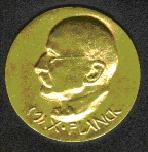
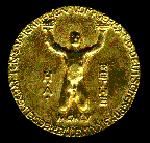
Max-Planck-Medal
Illustrations Credits: Courtesy
German Physical Society
(Deutsche Physikalische Gesellschaft e.V.),
Bad Honnef.
Dr. h. c. – awarded on November 9, 1929
On Saturday, November 9, 1929, the University of Paris awarded Albert Einstein the honorary doctorate in the hall of the Sorbonne. The principal of the university, the French historian Sébastien Charléty (1867-1945), awarded Einstein the honorary doctorate diploma.
On November 12, the Vossische Zeitung reported about the ceremony what follows:
“Einstein honorary doctorate of the Sorbonne. From Paris we hear: In the large amphitheater of the Sorbonne there was, on Sunday evening, under the chairmanship of the principal Professor Charléty and in the presence of the whole scientific and intellectual Paris, a festive presentation of the honorary doctorate and the insignias of an honorary doctorate of the University of Paris for Professor Albert Einstein. The dean of the faculty for mathematics and natural sciences, Professor Maurain, celebrated the merits and the work of Einstein in a speech which the audience interrupted through minute-long applause. Einstein stood up and thanked with a bow. The applause was even longer when the principal awarded Einstein the doctorate diploma and covered his shoulder with the “Robenschleife” in the colors of the city of Paris. The ceremony was also attended by the German ambassador v. Hösch, with whom Professor Einstein stays during his visit in Paris.”
The dean of the faculty for mathematics and sciences, who is mentioned in the article, was the French geophysicist Charles Honoré Maurain (1871-1967). The German ambassador in Paris was Leopold von Hoesch (1881-1936).
Einstein‘s stay in Paris began on November 7 and ended on November 14. During his stay he held two lectures in the Institute Henri Poincaré and took part in a meeting of the Académie des sciences and the academic society Societé française de Philosophie.
Dr. h. c. – awarded on November 7, 1930
On occasion of the 75th anniversary of the Swiss Federal Institute of Technology Zurich (Eidgenoessische Technische Hochschule, ETH), Albert Einstein was awarded the Honorary Doctorate of Science in a ceremony on Friday, November 7, 1930. The nomination was initiated by the department of mathematics of the ETH.
In the letter of the nomination it said: “To the completer of classical physics in the theory of relativity and the pioneer of quantum physics, its former student and teacher, in recognition of his excellent scientific performance and in thankful remembrance of his work which he performed for Switzerland and the college.”
The honorary doctorate of his Alma mater surely meant a lot to Albert Einstein.
From October 1896 to July 1900 Einstein had studied at the ETH and from October 1912 to March 1914 he worked there as full professor for theoretical physics.
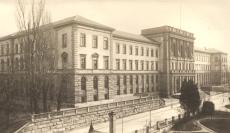
Illustration Credit: Courtesy
Bildarchiv ETH-Bibliothek, Zurich
Dr. h. c. – awarded on May 23, 1931
In May 1931 Albert Einstein travelled to England to hold the Rhodes Lectures (Cecil Rhodes, English politician, 1853-1902). This was a honorary task for him. During his stay he received the Honorary Doctorate (Dr. h. c.) of Science on Saturday, May 23, 1931 by the Oxford University which was founded in the 12th century.
At the presentation ceremony the “Public Orator” of the university held his speech, as tradition has it, in Latin. He ended with the words:
“…Hanc qui tandem ad homines detulit, insigne nostri saeculi decus, vobis praesento, Albertum Einstein, Scientiae Physicae in Universitate Berolinensi Professorem, ut admittatur ad gradum Doctoris in scientia honoris causa.”
Source: Oxford University Gazette, June 3, 1931
Translation:
“…Now I present the persons to you who have given us this theory: the fine specimen of our century, Albert Einstein, professor for physics at the TU (Technical University) Berlin, who shall receive the degree of a honorary doctorate.”
After the award, Einstein held his third and last lecture of the Rhodes Lectures. In the overcrowded Rhodes House he lectured in German about the “Latest development of the theory of relativity”. The room was crowded with honorary guests and members of the university, who had presented themselves in full regalia. Some places in the gallery were made available to the public.
Einstein had held his first lecture on “The theory of relativity” on Saturday, May 9 and the second one on the “Cosmologic problem” on Saturday, May 16. The board Einstein used for his second lecture was, provided with Einstein’s handwriting, kept and can be seen today in the Museum of the History of Science in Oxford. It shows calculations referring to the expansion of the universe and details about its age.

Illustration Credit: Courtesy
Museum of the History of Science,
University of Oxford.
Dr. h. c. – awarded on October 8, 1934
On Monday, October 8, 1934, Albert Einstein received in a ceremony the degree of an honorary doctor (Doctor of Humane Letters, honoris causa) of the Yeshiva College in New York, USA.
Einstein had approved of the award of the degree of an honorary doctor in a letter to the College dated September 1, 1934. Dr. Bernard Revel (1885-1940), the first President of the Yeshiva College in New York, USA, which was founded in 1928, welcomed the attendees to the ceremony on occasion of the award of the degree of an honorary doctor, which at the same time was the official beginning of the academic year 1934/35.
After the award of the degree of an honorary doctor Einstein held his acceptance speech. He spoke in German: „Es erfüllt mich mit besonderer Freude und Genugtuung …” (“It is my special pleasure and satisfaction…“). Further speakers were among others the Governor of the Federal State of New York, Herbert Henry Lehman (1878-1963), and Herman Bernstein (1876-1935), editor of the Jewish Daily Bulletin.
Franklin Institute, Philadelphia
Franklin Medal – awarded on May 15, 1935
On Wednesday, May 15, 1935 Albert Einstein received the Benjamin Franklin Medal (Benjamin Franklin, American politician, author and scientist, 1706–1790) in a ceremony. It was awarded in recognition of his fundamental contributions to theoretical physics; especially for his theories of relativity and his work on the photoelectric effect.
The Franklin Medal is one of the highest awards of the Franklin Institute. It was and still is awarded for special performance in the field of science and the arts. The Franklin Institute also awards other medals than the Franklin Medal.
In the ceremony, which took place in the evening at the Franklin Institute in Philadelphia, USA, not only the two Franklin Medals, but also five Longstreth Medals and seven Wetherill Medals were awarded. Einstein did not hold any speech.
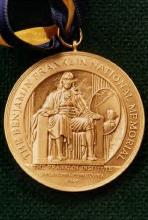
Benjamin Franklin Medal
Illustration Credit: Courtesy
Franklin Institute Online.
Dr. h. c. – awarded on June 20, 1935
In 1935 Albert Einstein received a new honorary doctorate, this time by the most traditional and most important university of the USA, the Harvard University in Cambridge, Massachusetts. It was Thursday, June 20, 1935 when he was awarded in a ceremony the Doctor of Science in a ceremony. The president of the university, J.B. Conant, said in a speech about Einstein: “…Acclaimed by the world as a great revolutionist of theoretical physics, his bold speculations, now become basis doctrine, will be remembered when mankind`s present troubles are long forgotten…”
Source: Harvard Alumni Bulletin, July 5, 1935
At the same time like Einstein, the German author Thomas Mann (1857-1955) was honoured. He was awarded the Doctor of Letters. About Mann, Conant said in his speech: “… Novelist of rare distinction, an interpreter of life to many in the western world, one of the few contemporary guardians of the great tradition of Germany culture …”
Source: Harvard Alumni Bulletin, July 5, 1935
Like Einstein, Mann and his family had also emigrated to the USA in 1933. Both the emigrants received long lasting applause from the people present at the presentation of awards. Thomas Mann later stated in a letter to his publisher that his and Einstein’s honorary doctorate “had not been possible without any interference of president Roosevelt“.
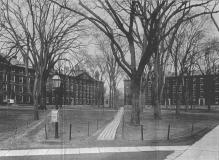
Campus, Harvard University,
ca. 1935
Illustration Credit: Courtesy
Harvard University Archives.
09/24


 DEUTSCH
DEUTSCH